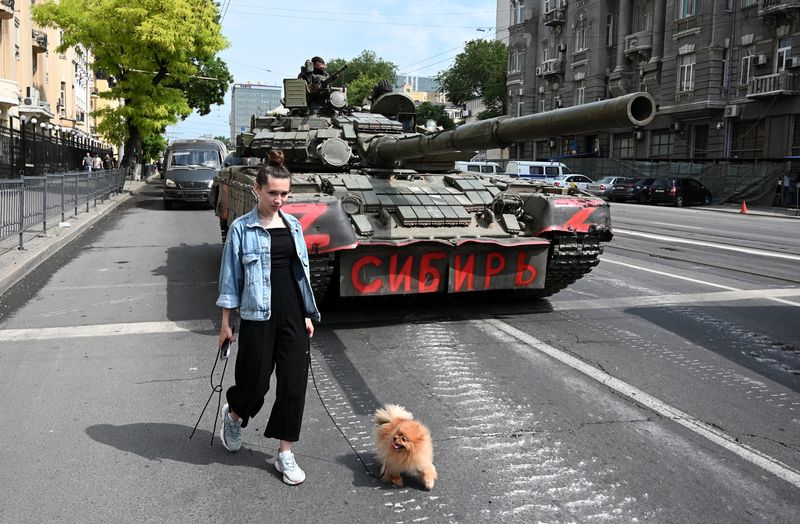Government
Rebel Russian Mercenaries Barrel Towards Moscow
Mutinous Russian mercenary fighters barrelled towards Moscow on Saturday after seizing a southern city overnight, with Russia’s military firing on them from the air but seemingly incapable of slowing their lightning advance.

Mutinous Russian mercenary fighters barrelled towards Moscow on Saturday after seizing a southern city overnight, with Russia’s military firing on them from the air but seemingly incapable of slowing their lightning advance.
Facing the first serious challenge to his grip on power of his 23-year rule, President Vladimir Putin vowed to crush an armed mutiny he compared to Russia’s Civil War a century ago.
The fighters of the Wagner private army run by former Putin ally Yevgeny Prigozhin were already most of the way to the capital, having captured the city of Rostov and set off on an 1,100 km (680 mile) race to Moscow.
Reuters saw troop carriers and a flatbed truck carrying a tank careening past the city of Voronezh more than half way to Moscow, where a helicopter fired on them. But there were no reports of the rebels meeting any substantial resistance on the highway.
Russian media showed pictures of small groups of police manning machine gun positions on Moscow’s southern outskirts Authorities in the Lipetsk region south of the capital told residents to stay home.
More than 100 firefighters were in action at a fuel depot ablaze in Voronezh. Video footage obtained by Reuters showed it blowing up in a fireball shortly after a helicopter flew by. Prigozhin accused Russia’s military of hitting civilian targets from the air as it tried to slow the column’s advance.
Prigozhin says his men are on a “march for justice” to remove corrupt and incompetent commanders he blames for botching the war in Ukraine.
In a televised address from the Kremlin, Putin said Russia’s very existence was under threat.
“We are fighting for the lives and security of our people, for our sovereignty and independence, for the right to remain Russia, a state with a thousand-year history,” he said.
“All those who deliberately stepped on the path of betrayal, who prepared an armed insurrection, who took the path of blackmail and terrorist methods, will suffer inevitable punishment, will answer both to the law and to our people.”
A defiant Prigozhin swiftly replied that he and his men had no intention of turning themselves in.
“The president makes a deep mistake when he talks about treason. We are patriots of our motherland, we fought and are fighting for it,” Prigozhin said in an audio message. “We don’t want the country to continue to live in corruption, deceit and bureaucracy.”
Prigozhin, whose private army fought the bloodiest battles in Ukraine even as he feuded for months with the top brass, said he had captured the headquarters of Russia’s Southern Military District in Rostov without firing a shot.
In Rostov, which serves as the main rear logistical hub for Russia’s entire invasion force, residents milled about calmly, filming on mobile phones as Wagner fighters in armoured vehicles and battle tanks took up positions.
One tank was wedged between stucco buildings with posters advertising the circus. Another had “Siberia” daubed in red paint across the front, a clear statement of intent to sweep across the breadth of Russia.
In Moscow, there was an increased security presence on the streets. Red Square was blocked off by metal barriers.
In a series of hectic messages overnight, Prigozhin demanded thata Defence Minister Sergei Shoigu and the chief of the general staff Valery Gerasimov should come to see him in Rostov.
Western capitals said they were closely following the situation in nuclear-armed Russia. The White House said President Joe Biden was briefed.
“This represents the most significant challenge to the Russian state in recent times,” Britain’s defence ministry said.
“Over the coming hours, the loyalty of Russia’s security forces, and especially the Russian National Guard, will be key to how this crisis plays out.”
Putin’s grip on power may depend on whether he can muster enough loyal troops to combat the mercenaries at a time when most of Russia’s military is deployed at the front in southern and eastern Ukraine.
The insurrection also risks leaving Russia’s invasion force in Ukraine in disarray, just as Kyiv is launching its strongest counteroffensive since the war began in February last year.
“Russia’s weakness is obvious. Full-scale weakness,” Ukrainian President Volodymyr Zelenskiy wrote in a social media message. “And the longer Russia keeps its troops and mercenaries on our land, the more chaos, pain and problems it will have for itself later.”
PRIGOZHIN’S REVOLT
Prigozhin, a former convict and long-time ally of Putin, leads a private army that includes thousands of former prisoners recruited from Russian jails.
His men took on the fiercest fighting of the 16-month Ukraine war, including the protracted battle for the eastern city of Bakhmut.
He railed for months against the regular army’s top brass, accusing generals of incompetence and of withholding ammunition from his fighters. This month, he defied orders to sign a contract placing his troops under Defence Ministry command.
He launched the apparent mutiny on Friday after alleging that the military had killed many of his fighters in an air strike. The Defence Ministry denied it.
“There are 25,000 of us and we are going to figure out why chaos is happening in the country,” he said, promising to destroy any checkpoints or air forces that got in Wagner’s way. He later said his men had been involved in clashes with regular soldiers and had shot down a helicopter.
Army Lieutenant-General Vladimir Alekseyev issued a video appeal asking Prigozhin to reconsider.
“Only the president has the right to appoint the top leadership of the armed forces, and you are trying to encroach on his authority,” he said.